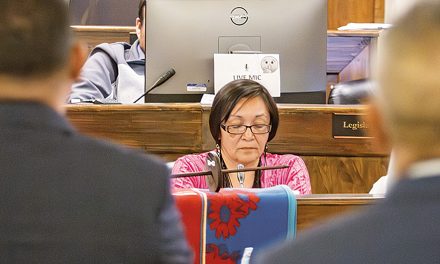
50 Years Ago: Police show up for duty, no disruptions during fair
The Navajo Tribal Fair has come and gone with no disruptions. All members of the Navajo Police showed up for duty at their assigned times.
They may not have been happy about it but they hoped that tribal officials would keep their promise and come through with major pay increases and overtime pay.
There had been rumors of officers calling in sick to show their disappointment that their demands were not addressed before the fair. But in the end, pleas by the department’s director, Lafia Bennett, to keep their loyalty oaths to the Navajo people carried the day.
Navajo Tribal Chairman Peter MacDonald had set up a committee to address the officer’s 17 demands with their findings expected to be on his desk by Nov. 1 with plans to enact some changes by the end of the year.
In interview with the press, MacDonald said he agreed that the department had taken advantage of the police officers using shortages as an excuse. They had failed to deal with growing crime on the reservation where delinquent teens broke into homes when families made their weekly trips to Gallup, Farmington, Holbrook, and to Winslow to shop.
The attention of the news media concentrated on the officer’s demands for a 25% increase in pay and payment for the first time for overtime hours. Other demands include transfer of officers from one district to another and a guarantee that the department would do as much as possible to deal with the traditional beliefs of some of the officers.
The transfer issue was taken serious by officers who were married and their spouses had jobs in the area where they were assigned. There were a number of officers who had been transferred to new districts hundreds of miles from their homes.
Since dividing a home in two different districts would cause serious problems in the marriage, officers wanted the ability to turn down a transfer or at least postpone it until all members of the family could make the relocation together.
The cultural concerns for the most part dealt with death, for which officers had to deal with calmly on a daily basis. There were a number of officers who were raised traditionally with various taboos involving association with death.
In talks with Navajo officers over the years, I never found anyone who would not work on any assignment where someone had died. After all, anyone working traffic would routinely have to handle a fatality on the road several times a year.
They realized that this was just part of the job but to appease other members of their extended family that took these taboos seriously, the officer would have to contact a medicine man on occasion and have a ceremony done to protect him and the members of his family from negative consequences of dealing with a dead body.
These ceremonies cost money and although extended family members could be counted on helping to defray the costs, officers felt that since this was work related, it would seem appropriate that the department should pay for part of this expense.
Bennett had pledged to his officers that he would support their efforts for salary increases and overtime pay but he admitted that he had little hope that the council would approve a 25% increase. He suggested that the officers ask for a 15% increase over three years.
As for the transferring of officers, he said the department tries as much as possible to accommodate the officers who are married but there are times when such a transfer needs to be made to maintain leadership at all of the substations.
He mentioned a situation a few years ago when a vacancy occurred in Shiprock when the captain there retired. The lieutenant did not have the experience necessary to run the branch so the captain running the Window Rock office was assigned to hold down the fort until a permanent captain was found.
Since this process could take several months and the captain was married with children, he was allowed to commute daily back and forth. Since the trip took more than an hour, he was allowed to report for duty at 9 a.m. and leave at 4 p.m. if he was able to.
He said the department didn’t seem to have a problem when it had to transfer a patrolman from one district to another since there were many available to choose from and someone could have volunteered for transfer.
As for reimbursement to defray the cost of ceremonies, Bennett said that would have to get approval from the council since the department currently didn’t have the authority to do that.
He also pointed out that part of the department’s funding came from a BIA grant and it may have been possible to get a waiver from the BIA to use some of its annual grant for that purpose.
He said officers have to be ready to deal with death because it is part of the job and they should have been aware of this when they applied. If this was a problem, they probably would not have applied.
Given all of this, there seems to be at least one area where special attention was given to all officers who were Navajo regardless of their level of adherence to Navajo custom. And that had to do with those officers whose wives became pregnant.
One of the taboos surrounding death said it would cause problems to a wife and unborn child while she was pregnant.
Whether you believed in that or not, Bennett said there were enough people who did that if something did go wrong in the pregnancy, a segment of the Navajo population would blame the officer’s job.
For this reason, he said, officers who had wives who were pregnant were not assigned to deal with fatalities on the road or elsewhere until their child was born.








 Highway 264,
Highway 264, I-40, WB @ Winslow
I-40, WB @ Winslow